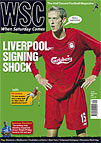 David Stubbs on how the AFC Wimbledon story has been brought to the stage
David Stubbs on how the AFC Wimbledon story has been brought to the stage
Written by Matthew Couper, a local government arts officer and sometime stand-up comedian, A Fans’ Club is a modest theatrical undertaking but a worthy addition to that invidious yet strangely resilient genre – the football musical. It tells the story of a group of four Wimbledon fans who look on in passive astonishment as their beloved club is snatched from them by the seemingly larger, inevitable powers of commercial interest and dumped in Milton Keynes, their wishes ignored “like a tramp’s coat”. In the second act, however, moved by the spirit of the club that still lingers and pull together to form AFC Wimbledon. Commentating on this heroic turnaround are two “footballing Gods”, Hun-Batz and Hun-Choen, one of the play’s better devices, the “monkey twins” taken from Mayan mythology, who add both levity and a sense of the wider world of events.
This is a rewritten version of Couper’s original draft, first presented in 2004, which the author confesses was more “statistic” than dramatic. However, his attempt to inject a little needling class warfare between the lawyer season ticket holder, but only occasional attender, Eddie (Roger Woods) and the Harry Enfield-like bish-bosh Alan (Matt Emery) is a little ham-fisted and half-hearted, and, like many other aspects of the play, could do with reworking again if it were to appeal to a wider audience than the Brockley Jack theatre or the Edinburgh Festival.
However, A Fans’ Club, like the undertaking it depicts, is a play that you really find yourself pulling for. And so, you overlook the trundling out yet again of Bill Shankly’s quotation about football, life and death and all that in the prologue. You indulge the occasional damp squib of a gag. You don’t mind their bursting into song now and again, especially when Dave (Mark Homer, who played Tony Hills in EastEnders) ruefully remarks of his unsuccessful presentation to the footballing authorities, “I tried everything. I even sang.” You even suspend any aesthetic qualms you might have about the generic indie rock soundtrack written by Chris Barlow. Indeed, you even admit defeat and tap into the flow of it, realising that this sort of cheery/melancholy, swaying, anthemic singer-songwriting, faintly redolent of fried onions and stadium camaraderie, is the most appropriate soundtrack to a play like this.
And it does work, so long as you accept it for what it is – a local theatre production and a labour of love, pulled off with enough humour, gentle passion and lucidity to keep you engaged for its 90-minute span. Its resourcefulness is impressive, too – the props consist of six chairs, painted in Wimbledon blue and yellow. At the interval, we’re shooed out of the auditorium so that the stagehands “can rearrange the scenery” for the second half. We return to find two of the chairs have been moved.
But A Fans’ Club deserves more than a faintly condescending pat on the back, or critical favouritism granted merely on account of its consciousness-raising on behalf of the Wimbledon Supporters Trust and efforts on the part of supporters generally to try to stave off the detachment they feel as the game is swallowed up by big business. One of the best exchanges in A Fans’ Club concerns the lack of football films. Take away the ones about hooliganism, they grumble, and you’re left with the likes of Escape To Victory, When Saturday Comes and Fever Pitch, which they complain fails to credit Wimbledon, whose late season draw with Arsenal (re-enacted here) set up the Anfield finale. The point is well made. The daft, decent, determined groundswell of supporters who bring about the formation of the AFC Wimbledons of this world have always been given short shrift, if any shrift at all, in drama. A Fans’ Club is an honourable attempt to redress that, an idea which deserves wider attention and further development.
From WSC 223 September 2005. What was happening this month